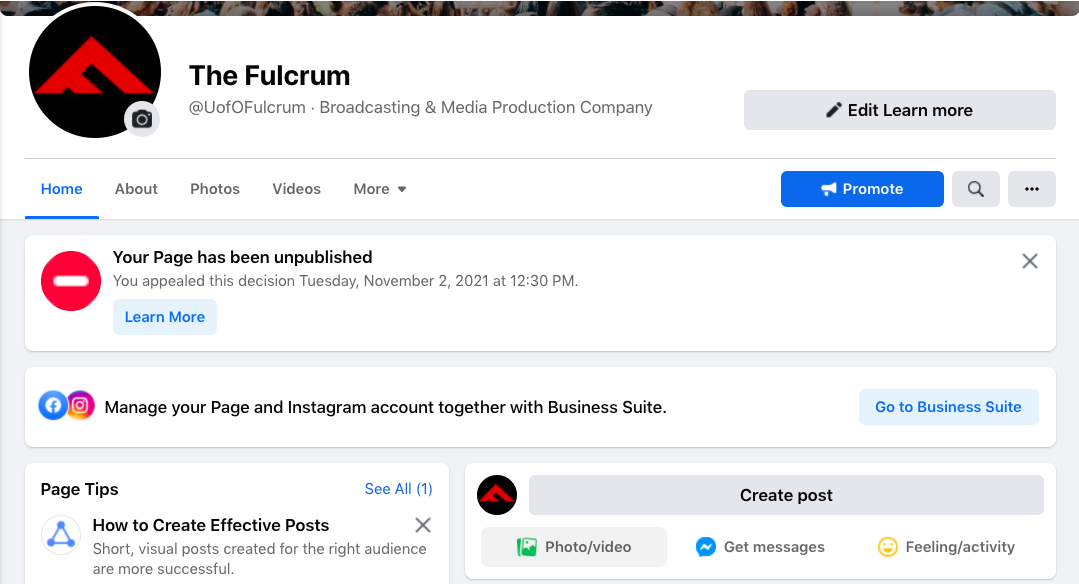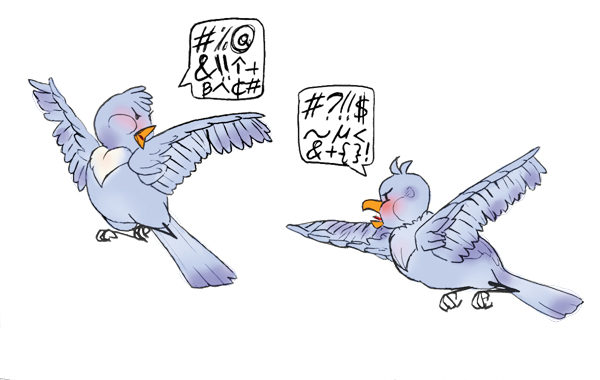The Fulcrum’s page was unpublished back on Oct. 22 — we have appealed the decision twice and still haven’t gotten an answer
On Oct. 22, the Fulcrum’s Facebook page was unpublished for, allegedly, breaking Facebook’s page policies. Which policies? We couldn’t tell you. Since then, our editor-in-chief has launched two appeals to Facebook, but we still have yet to hear back from the social media giant.
In terms of time, Facebook seems to be taking lessons from certain organizations on campus when it comes to answering media requests — it’s been nearly a month, and still nothing.
Although Facebook has lost in popularity with younger students, it remains the most popular social media platform across all age groups. As opposed to other social media platforms like Instagram and TikTok, Facebook is used by folks of all ages. This means students who pay for the Fulcrum, and aren’t on Instagram or Twitter, have been unable to access our content via their only social media platform. Their only option is to go to our website and scroll for themselves — something most people simply don’t have the willpower to do in 2021.
While some might say we should cut our losses and create a new page, it isn’t that simple. When our page was unpublished, we had over 3,200 likes and over 3,339 people who followed us. We have accumulated these likes and followers since our page’s inception in the late aughts. Starting a new page would also entail abandoning years of content which can only be found publicly on our Facebook, as our website does not go back beyond 2011.
We are dependent on Facebook, a situation we acknowledge is problematic. Social media platforms are owned by private corporations, and at the end of the day, those corporations have the power to decide who can use their platforms. Some may consider this a good thing when it comes to censoring opinions that can be considered racist, homophobic, sexist etc… but when the platform uses this power to censor news organizations like the Fulcrum, it’s problematic.
Can the Fulcrum live without Facebook? Technically, yes, we aren’t financially reliant on clicks produced from Facebook — we get a huge levy from student fees, which constitutes the majority of our revenue. But, without a Facebook page, we are failing those who pay that levy and rely on the platform to get their U of O news.
We publish important stories, and those usually get most of their reads from Facebook. Just this week, our news editor Zoë Mason provided an important update on the pending lawsuit that has been brought against the University of Ottawa, the University of Ottawa’s Health Services (UOHS), and the number company that managed UOHS and Vincent Nadon. The story couldn’t be shared by us on Facebook, and thus many U of O students were left in the dark. This is without counting those who couldn’t read the original story due to it being publicized on Facebook on Oct. 4 — the day the platform was down around the world from approximately 11 a.m. to 8 p.m. — highlighting another issue with the overreliance on Facebook by news organizations such as ourselves.
Facebook is reliant on the content created by its users. As sad as this may sound, a significant portion of the population gets its news from Facebook — without news on its platform Facebook would lose much of its daily traffic — people aren’t going on Facebook to see Karen’s three cats, sorry.
So, Facebook, please give us back our page. Thank you.
Editorials are written by the Fulcrum’s 15-person editorial board and express the shared views and opinions of the Fulcrum’s editorial staff. To share your own views, email editor@thefulcrum.ca.





